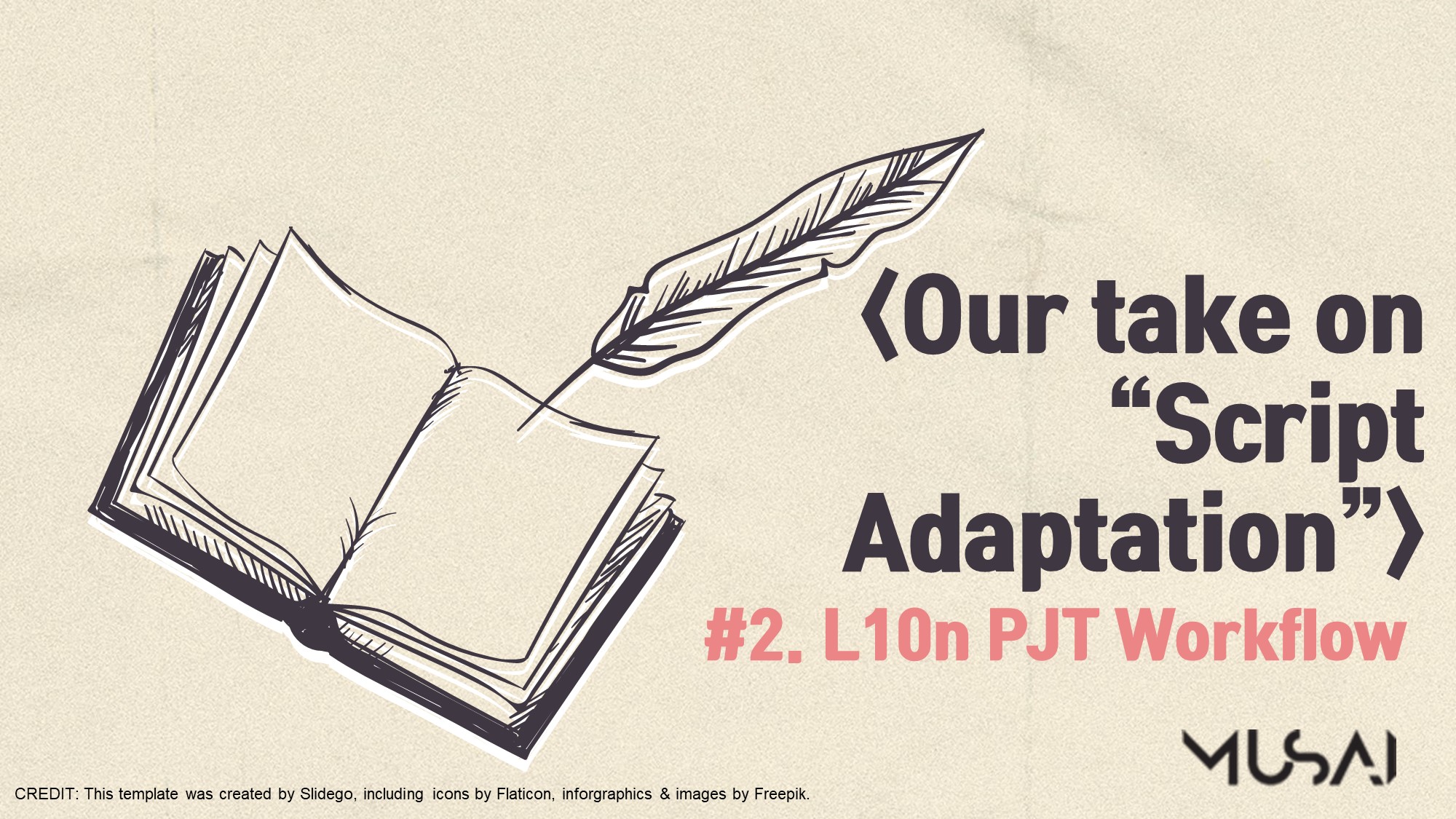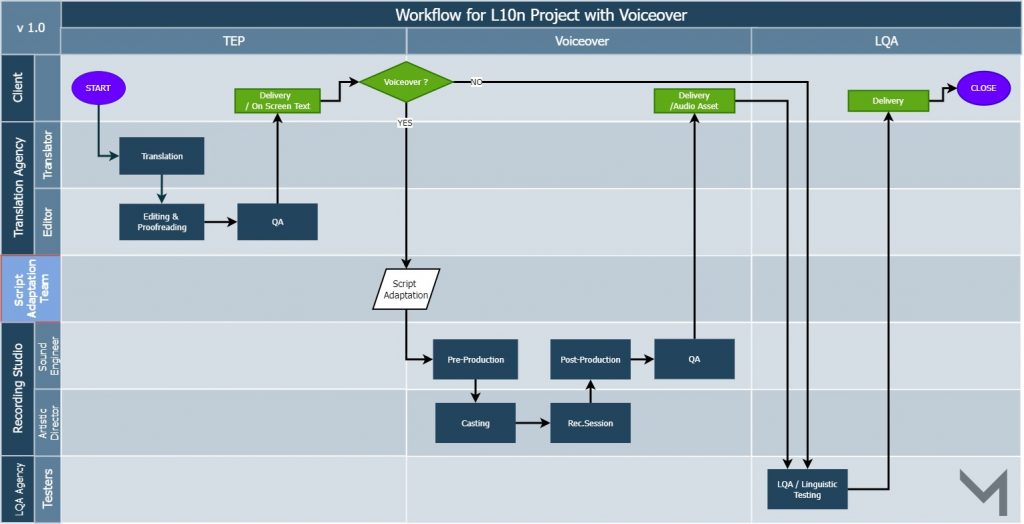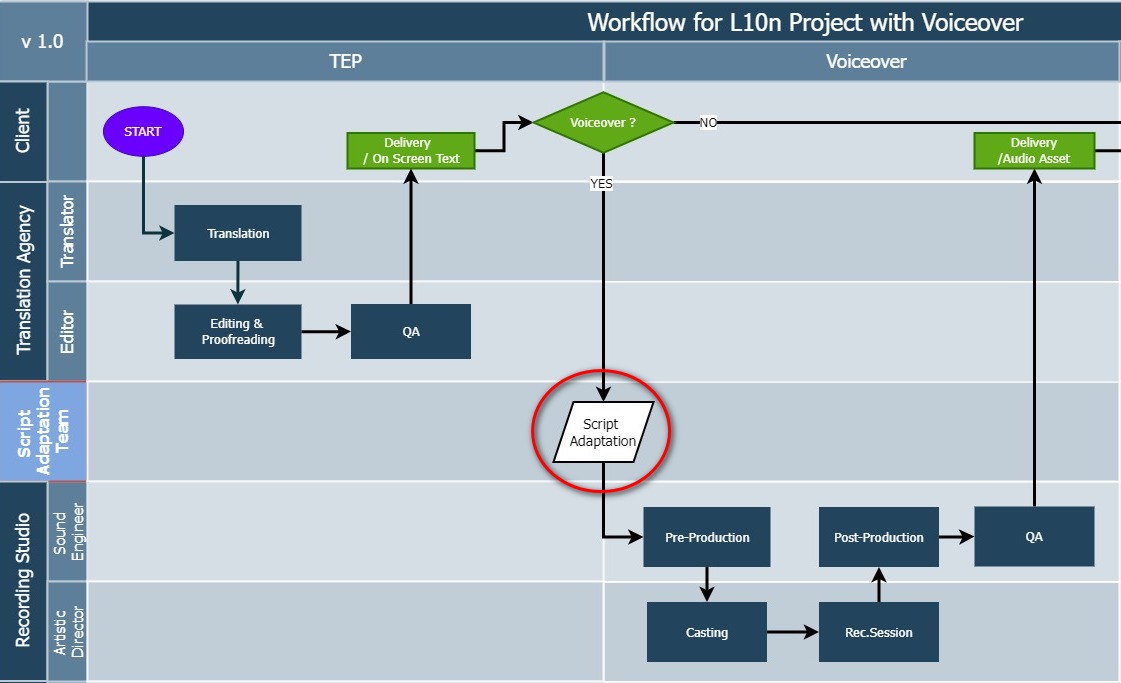[Musai Studio] Our Take on “Script Adaptation” Part 2

In the last article, we shared our thoughts on what script adaptation is, why it is necessary for localizing video games, and how it differs from other media such as animations and movies.
*Reference article
[Musai Studio] Our Take on “Script Adaptation” Part 1
As stated in the article above, the lack of information is the most significant factor that makes the adaptation task ever so challenging, not to mention the fact that scripts are often provided in an incomplete state.
As many of you may already know, the reason for such issues arises from tight schedules that require the localization project to start in the middle of the game development. This is because developers and publishers need to ensure the game is localized on the date of release.
We would like to review these issues from a bit different perspective at this time.
Please refer to the diagram below that roughly explains the process of a video game’s audio localization. (The actual process is, in fact, much more complicated)
Question: Who takes care of the localization project?
The main parties involved in localization projects which included voiceover are translation agencies, recording studios, and testing companies.
Translation agencies have multiple resources optimal for the text localization, such as project managers, translators, reviewers, and engineers, while recording studios also have their own for the audio localization, including artistic directors, sound engineers, and project managers, and both parties are optimized for each work.
Clients, who often are game developers and publishers, sometimes have separate managers for text and audio localization.
Q: Who takes charge of the script adaptation?
Considering the diagram above, it would be ideal for the translation agency to take charge of the script adaptation along with the text localization. In most cases, however, there isn’t enough information available in the text localization stage to go through such a process. The following examples show different circumstances explaining why:
- UI (User interface, Menu, etc.) and Dialogues (Script) are often mixed up, making it hard to recognize which part needs the adaptation.
- Dialogues are sorted appropriately but not confirmed whether they’re for audio localization or subtitles only.
- Lack of context information related dialogue such as speakers and quest information and etc.
Even in the text localization stage, translation agencies struggle to deal with tight deadlines, making it difficult to put extra work into adapting the script. Unless the company localizes both text and audio like here at Musai Studio, most agencies do not take on the responsibility of script adaptation due to the circumstances described above.
That said, it would make sense to go through the adaptation stage before the audio localization begins. As mentioned, however, clients sometimes separate organizations or managers for text and audio localization and usually assign different localization service providers according to the task (TEP & Voiceover).
When such things happen, the new manager may deem the script to have already been adapted and request the studios to proceed with the recording without giving them enough time to do script adaptation.
That is why we go through preliminary inspections on the scripts to figure out if they’re ready to be recorded, which in many cases, need further adaptation.
As you can see from the highlighted part in the picture above, the script adaptation stage is right between the text and audio localization project. This makes the adaptation task all the more important, but the question of who takes charge of such tasks is often unclear or overlooked in the process.
To deal with such issues flexibly and improve the overall quality of the final product, we have been running an internal team dedicated to the script adaptation only. This is possible because Musai Studio is the only domestic studio that localizes both text and audio internally.
For the last two years since the launch, the script adaptation team has put a lot of time and effort in and out of recording rooms. We would like to express our gratitude to them for their hard work over the past few years.
![[Picture 1] Musai Studio’s Script Adaptation Team (Source: Musai Studio)](http://blog.musaistudio.com/wp-content/uploads/2022/06/Musai_ScriptAdaptation_Team1-1024x718.jpg)
As always, we Musai Studio will do our best to provide gamers with the best immersive gaming experience they deserve.
** Did you enjoy this article? Please click subscribe and share this story.
BOOST YOUR PLAY! Musai Studio









